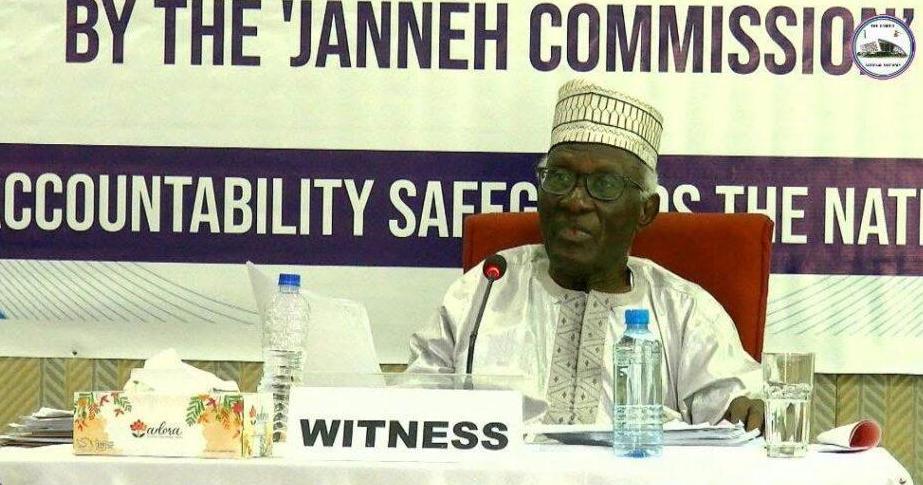Africa-Press – Gambia. Surahata Janneh, former chairperson of the Janneh Commission, appeared before the National Assembly Select Committee on Tuesday to provide testimony regarding the sale and disposal of assets belonging to former President Yahya Jammeh.
During the hearing, lead counsel Lamin M. Dibba questioned Mr. Janneh on whether he had been contacted by any government ministry prior to the establishment of the commission. In response, Janneh said he could not recall any such communication.
“Because what I consider to be the establishment of the commission is the issuance of the commission by the President of the Republic of the Gambia,” Janneh stated that he had previously discussed with the Attorney General his willingness to serve as chairperson of the commission.
When questioned by counsel about who initiated the conversation regarding the commission, the witness replied that it was Attorney General Ba Tambadou, whom he knows well, and that the attorney general was the one who initiated the discussion.
The counsel then asked, “After establishing the commission, did you undergo any briefing from the government as to the expectations of the commission?”
The witness confirmed that he did undergo a briefing, along with two of his colleagues.
“I want to make it clear here, maybe we can say, big commission, understanding that the name is very long. Now I want to make it clear because there is a great misunderstanding. That is why I want to make it very clear that you have a commission, that you have a commission of inquiry, and that commission of inquiry has only three commissioners, and that can be verified,” he said.
The witness states that the composition of the Janneh Commission can be verified from a document referred to as SBS 2. According to the witness, the document clearly states that the commission is composed of Surahata Janneh, Abiosseh George, and Bai Mass Saine. He emphasized that these are the only individuals he recognizes as commissioners.
The witness also disclosed that several meetings were held with the Attorney General at the AG’s office. While some of the meetings involved the commissioners, others included individuals supporting the work of the commission, such as the lead counsel and the secretary. One particular meeting, he said, focused on preliminary discussions rather than the composition of the commission.
He clarified that there was no specific act establishing the Janneh Commission. Instead, the commission operated under the Commission of Inquiry Act, which he described as a general framework for all commissions of inquiry. Their mandate, he explained, was guided by three key documents: the Constitution, the Commission of Inquiry Act, and the Terms of Reference (TOR).
The witness added that the three commissioners, along with the secretary, the lead counsel, and the Solicitor General—whose name he could not recall—had to sit together to determine how to proceed under the legal framework provided.
“It was made clear to us that we would have no budget of our own. The TRCC has its own budget, we were not to spend any money, and we had to be completely dependent on the government for any money we expended,” he said.
Counsel informed the witness that the committee wished to know whether, during that meeting, the scope and functions of the commission were discussed in such detail that they aligned with the provisions outlined in the 2017 Legal Notice.
The witness responded that this was not exactly the case, adding that everything depended on the three instruments he had previously mentioned.
Counsel Dibba then asked, “How did you interpret your role as the chairperson.”
In response, the witness referred the committee to a document which indicated that the chairperson held a special role only in the sense that they chaired the commission. He explained that, as is common in many organizations, the chairperson would ordinarily have a casting vote in the event of a tie—although this was not explicitly stated in the document.
He emphasized that the chairperson had no special powers and that all members were equal, with his role limited to that of chairing the commission.
“So we decided to act by consensus and not by voting. And I will tell you that I cannot remember once when we disagree,“ he said.
Counsel Dibba questioned the witness on whether he was aware of a legal suit involving the Attorney General and Yahya AJJ Jammeh.
In response, the witness said he could not recall the case and asked for clarification. Counsel then explained the nature of the suit to him.
The witness was further questioned about the distinction between the Terms of Reference (TOR) and the mandate of the commission.
He replied that the commission’s primary mandate is outlined in Section 202 of the Constitution.
For More News And Analysis About Gambia Follow Africa-Press






